上外版(2020)必修二:Unit 4 Sports 单元语法课件(分词做状语用法)(53张ppt)
文档属性
| 名称 | 上外版(2020)必修二:Unit 4 Sports 单元语法课件(分词做状语用法)(53张ppt) |

|
|
| 格式 | pptx | ||
| 文件大小 | 2.2MB | ||
| 资源类型 | 教案 | ||
| 版本资源 | 上外版(2020) | ||
| 科目 | 英语 | ||
| 更新时间 | 2021-10-18 08:40:25 | ||
图片预览



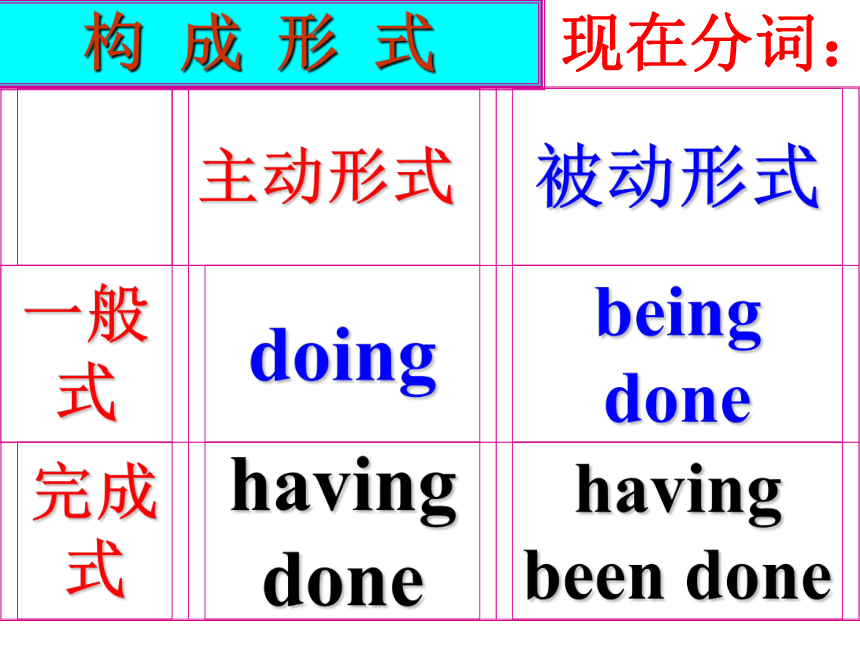

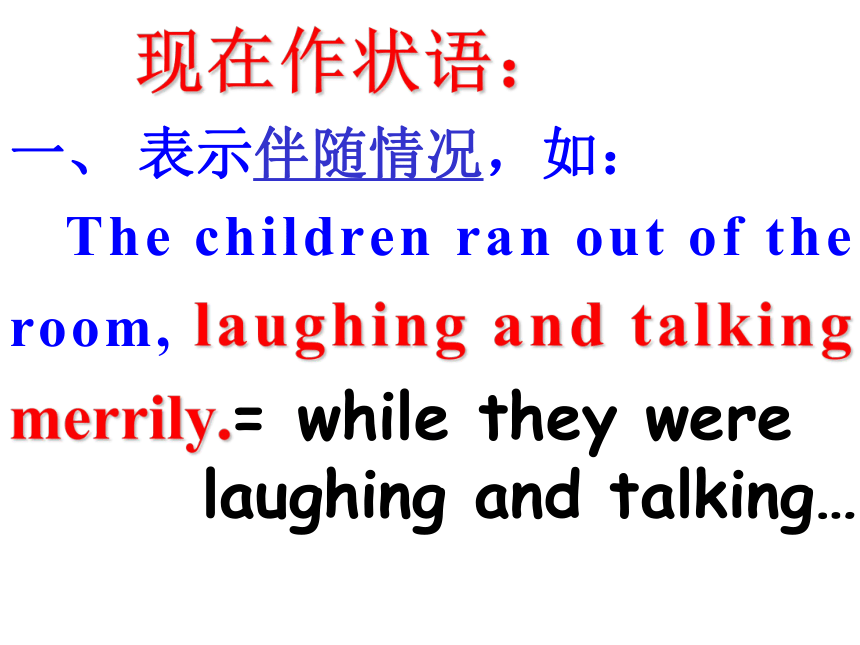
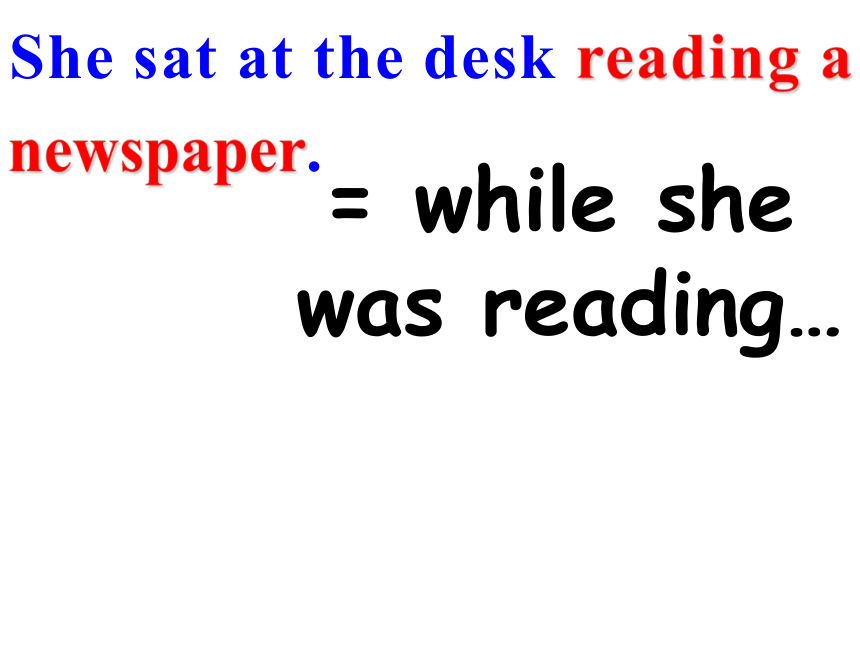

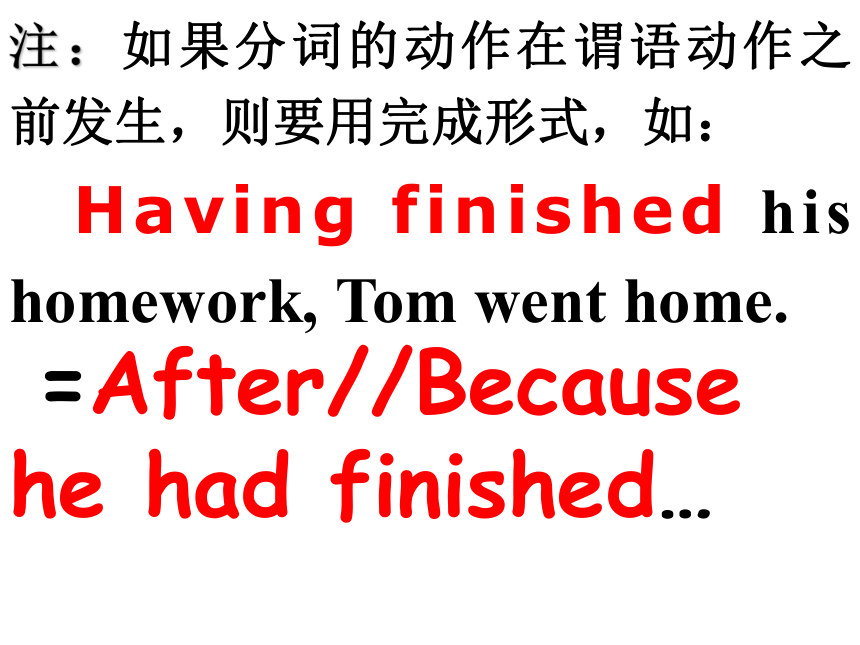
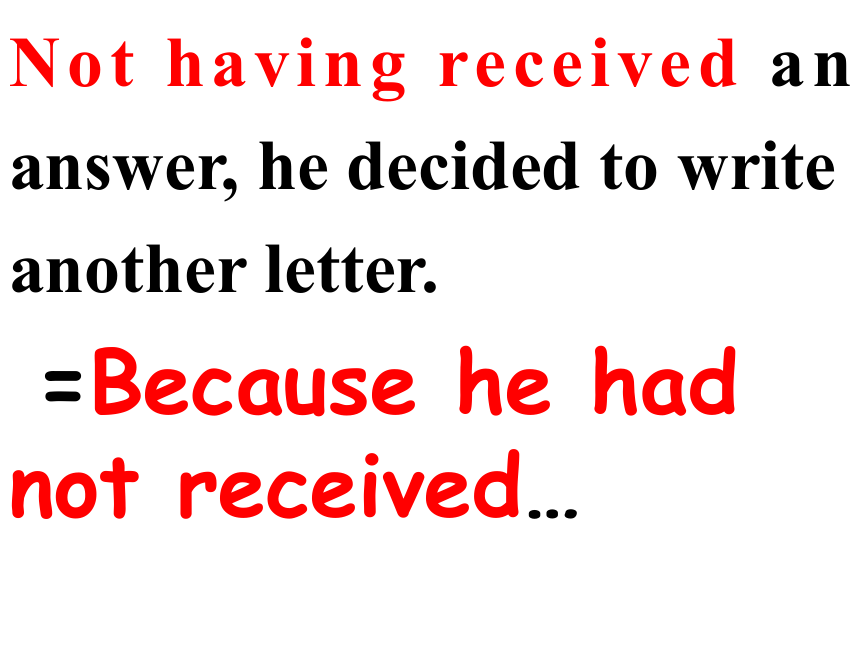

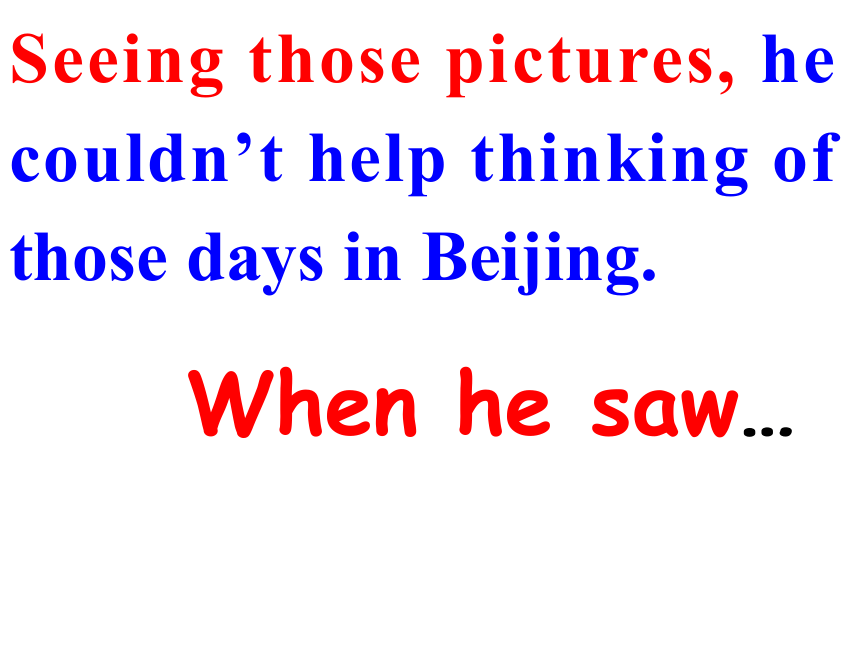
文档简介
(共53张PPT)
Unit 4 Sports
必修二
上外版
2022
CONTENT
现在分词做状语
过去分词做状语
现在分词做状语
构 成 形 式
主动形式
被动形式
一般式
doing
being done
完成式
having done
having been done
现在分词:
现在分词的否定式
not/never having done
not/never doing
not/never being done
not/never having been done
现在作状语:
一、 表示伴随情况,如:
The children ran out of the room, laughing and talking merrily.
= while they were laughing and talking…
She sat at the desk reading a newspaper.
= while she was reading…
二、表示原因或理由:
Seeing nobody at home, she decided to leave them a note.
Not knowing her address, we couldn’t get in touch with her.
= As she saw……
Because we didn’t know…
注:如果分词的动作在谓语动作之前发生,则要用完成形式,如:
Having finished his homework, Tom went home.
=After//Because he had finished…
Not having received an answer, he decided to write another letter.
=Because he had not received…
三、作时间状语(相当于 when 引导的从句):
Hearing the news, they all jumped with joy.
=
When they heard…
Seeing those pictures, he couldn’t help thinking of those days in Beijing.
When he saw…
注①:如果两个动作同时发生的,多用 when 或 while + 分词这种结构,如:
Be careful when crossing the street.
Don’t mention this while
talking to him.
you are
you are
注②:如果要强调谓语动词的动作发生时,分词的动作已经完成,要用完成形式:
Having heard the result, the spokeswoman expressed her opinion
After she had heard
四、现在分词作状语还可以表示结果、条件和让步,如:
The bus was held up by snowstorm, thus causing the delay.
=
thus it caused …
Working hard, you will succeed.
Weighing almost 100Kg, the stone was moved by him alone.
If you work hard
Although it weighed…
状语从句的省略:
1.状语从句中如果从句的主语与主句的主语相同,且从句谓语中含有be动词的某种形式,则将从句引导词和从句主语以及be动词一起省去。
2.状语从句中如果从句的主语与主句的主语相同,但从句谓语中不含有be动词的某种形式,则将从句引导词和从句主语一起省去,谓语部分第一个改为-ing 形式。
Hearing their teacher's voice, the pupils stopped talking at once.
Don't be careless when /while having an exam.
When they heard…
When you are…
Having finished his homework the boy was allowed to watch TV play.
After he had finished…
Not knowing how to work out the difficult physics problem, he asked the teacher for help.
Because he didn’t know…
Having lived with the girl for 5 years, we all know her very well.
Because//After//Since
//As we have lived…
Being ill, he still keeps taking exercise.
Although he is ill…
现在分词的完成形式和被动形式
① 现在分词的完成形式主要用在状语中,表示动作在谓语动作之前发生,如:
Having been there many times, he offered to be our guide.
② 在表示一个被动的动作时,如果这个动作是现刻正在进行的,或是与谓语表示的动作同时发生的,就可以用现在分词的被动形式。这种形式可以作定语、状语或构成复合宾语,
That building being repaired is our library.
You’ll find the topic being discussed everywhere.
Being protected by a thick wall, they felt they were quite safe.
过去分词做状语
过去分词作状语
过去分词(短语)作状语,表示被动的或完成的动作, 这时句子的主语和过去分词之间为逻辑上的被动关系。
Written in a hurry , this article was not so good .
因为写得匆忙,这篇文章不是很好。本句中的written 即为过去分词作状语,表示这篇文章是被写的,而且已经被写完。
过去分词通常在句中作时间状语、原因状语、条件状语、让步状语、方式状语和伴随状语等。
1.过去分词作时间状语,在句中相当于一个时间状语从句。
Asked about his address ( = When he was asked about his address ) , the boy didn ' t respond .
问及他的地址时,小男孩没有作答。
2.过去分词作原因状语,在句中相当子一个原因状语从句。
Annoyed at the decision ( = As he was annoyed at the decision ) , he refused to attend the meeting .
由于生气这个决定,他拒绝参加会议。
3.过去分词作条件状语,在句中相当于一个条件状语从句。
Given more time ( = If they were given more time ) the trees could grow taller .
如果再多给一点时间,这些树会长得更高。
Heated to a high temperature ( = If it is heated to a high temperature ) , water will change into vapor .
如果加热到高温,水就能变成蒸汽。
4.过去分词作让步状语,在句中相当于一个让步状语从句。
Though having been warned of the storm ( = Though they had been warned of the storm ) , the farmers were still working in the fields .
尽管被警告过有暴风雨,农民们仍然在田地里劳作。
5.过去分词作方式、伴随状语。
Followed by a group of students , the teacher entered the classroom .
= The teacher entered the classroom and he was followed by a group of students .
老师走进教室,后面跟着一群学生。
注意:
过去分词(短语)作状语时,前面有时可以加上 when , if , while , though , even if , until , unless等连词 , 这种结构可以看作是一种省略的状语从句(省略部分多为“主语+be的多种形式”)。需要注意的是,省略的主语必须和主句的主语相同或为it。
Even if invited ( = Even if I ' m invited ) , I won ' t take part in the party .
即使受到邀请,我也不会参加那个聚会的。
现在分词也可以作状语,与过去分词作状语的最主要区别在于:
两者与所修饰的主句的主语的逻辑关系的区别。
(1)现在分词作状语时,现在分词所表示的动作与句子主语之间构成逻辑上的主动关系。
The girl went out , shutting the door behind her .
女孩出去后将门随手关上。
Not knowing what to do , she went to her parents for help .
由于不知如何是好,她去找父母帮忙。
(2)过去分词作状语时,过去分词所表示的动作与句子主语之间构成逻辑上的被动关系。
Given more encouragement , the girl could have behaved better .
如果多给这个女孩一些鼓励,她本来会表现得更好。
Faced with , you must try to overcome them .
在遇到困难时,你必须设法去克服。
(3)部分过去分词来源于系表结构,作状语时不表示 “被动关系”,其前不用being 。这样的过去分词及短语常见的有:lost in (陷入某种状态)、seated((坐着的)、 hidden (躲着 ) . lost / absorbed(沉溺于 ) dressed in (穿着)、tired of (厌烦了)等。
Lost / Absorbed in deep thought , she didn ' t hear the sound .
沉溺于思考中,她没有听到那个声音。
Born in this beautiful town , the girl hates to leave it .
出生于这个美丽的小镇,女孩不愿离开它。
总结对比
as adverbials
as adverbials
continuing
past action
active
passive
verb-ing
verb-ed
as adverbials
时间状语
Asked about his address, the boy didn’t respond.
=When he was asked about his address,the boy didn’t respond.
Walking in the park,she saw an old friend.
=When/While (she was) walking in the park,she saw an old friend.
as adverbials
原因状语
Annoyed at the decision,he refused to attend the meeting.
=As he was annoyed at the decision,he refused to attend the meeting.
Being ill,he couldn’t go to school.
=As he was ill,he couldn’t go to school.
as adverbials
条件状语
Given more time ,we could have better work.
=If they were given more time, we could have better work.
Working hard,you’ll make great progress.
=If you work hard,you’ll make great progress.
as adverbials
结果状语
He fell off a tall tree, his leg broken.
=He fell off a tall tree, and his leg was broken.
He was caught in the rain,thus making himself catch a cold.
=He was caught in the rain,which made himself catch a cold.
I hurried to school,only to find it was Sunday.
as adverbials
让步状语
Trained ten hours a day, he will still be a fool.
=Even if he was trained ten hours a day, he will still be a fool.
Though knowing all this,they made me pay for the damage.
=Though they knew all this,they made me pay for the damage.
as adverbials
方式状语
Mary sat by the window of the classroom,reading a book.
=Mary sat by the window of the classroom and was reading a book.
as adverbials
伴随状语
Followed by a group of students,the teacher entered the classroom.
=The teacher entered the classroom and he was followed by a group of students.
Following a group of students,the teacher entered the classroom.
=The teacher entered the classroom and he followed by a group of students.
as adverbials
Though warned of the storm,the farmers were still working in the fields.
While admitting he was involved in the crime, he denied taking part in it.
过去分词(短语)作状语时,前面有时可以加上when,if,while,though,even if,until,unless等连词。需要注意的是,省略的主语必须和主句的主语相同或为it。
为强调动词-ing形式表达的意义,可在其前加上各种连词。例如,加上when,while,强调与谓语动词同时发生;加上before,after,强调动作先后发生;加上thus,强调结果;加上(al)though,强调让步等。
as adverbials
Walking in the street,I met an old friend of mine.
Having finished the letter,he went to post it.
Having been shown around the factory,they were very happy.
Having finished his homework,he went to bed.
Not knowing this,he didn’t come.
Not having made full preparations,we put off the sports meeting.
as adverbials
_______ from the hill, you will find the city looks like a big garden.
_______ from the hill, the city looks like a big garden.
Seeing
Seen
active
passive
as adverbials
________ for a long time, the book looks old.
________ the book, I find it useful.
________ at her, he jumped with joy. (look)
________ at by her, he jumped with joy. (look)
________ with his room, mine is smaller.(compare)
________ with his room, I found mine smaller.(compare)
Compared
Used
Using
Looking
Looked
Comparing
Fill in the blanks :
_________ (turn) to the right , you will
find the place you want .
2. ___________ (ask) to put on performance , she refused .
3. _______________ (finish) his work , Henry went home .
4. ________ (learn) new words is useful.
Turning
Being asked
Having finished
Learning
5. He disliked _____________ (interrupt)
in his experiment .
6. I apologize for ________________
(not, wait) for you .
7. _________________ (not, receive) an
answer , I wrote to him again .
8. ____________________ (give) such
a good chance , you should catch it .
being interrupted
not having waited
Not having received
Having been given
9. I didn’t mind ___________ (leave)
at home .
10. The house wants _________ (clean).
11. He came in without _________ (ask).
12. ________________ (show) around
the library , we were taken to see
the lab.
being left
cleaning
being asked
Having been shown
THANKS
Unit 4 Sports
必修二
上外版
2022
CONTENT
现在分词做状语
过去分词做状语
现在分词做状语
构 成 形 式
主动形式
被动形式
一般式
doing
being done
完成式
having done
having been done
现在分词:
现在分词的否定式
not/never having done
not/never doing
not/never being done
not/never having been done
现在作状语:
一、 表示伴随情况,如:
The children ran out of the room, laughing and talking merrily.
= while they were laughing and talking…
She sat at the desk reading a newspaper.
= while she was reading…
二、表示原因或理由:
Seeing nobody at home, she decided to leave them a note.
Not knowing her address, we couldn’t get in touch with her.
= As she saw……
Because we didn’t know…
注:如果分词的动作在谓语动作之前发生,则要用完成形式,如:
Having finished his homework, Tom went home.
=After//Because he had finished…
Not having received an answer, he decided to write another letter.
=Because he had not received…
三、作时间状语(相当于 when 引导的从句):
Hearing the news, they all jumped with joy.
=
When they heard…
Seeing those pictures, he couldn’t help thinking of those days in Beijing.
When he saw…
注①:如果两个动作同时发生的,多用 when 或 while + 分词这种结构,如:
Be careful when crossing the street.
Don’t mention this while
talking to him.
you are
you are
注②:如果要强调谓语动词的动作发生时,分词的动作已经完成,要用完成形式:
Having heard the result, the spokeswoman expressed her opinion
After she had heard
四、现在分词作状语还可以表示结果、条件和让步,如:
The bus was held up by snowstorm, thus causing the delay.
=
thus it caused …
Working hard, you will succeed.
Weighing almost 100Kg, the stone was moved by him alone.
If you work hard
Although it weighed…
状语从句的省略:
1.状语从句中如果从句的主语与主句的主语相同,且从句谓语中含有be动词的某种形式,则将从句引导词和从句主语以及be动词一起省去。
2.状语从句中如果从句的主语与主句的主语相同,但从句谓语中不含有be动词的某种形式,则将从句引导词和从句主语一起省去,谓语部分第一个改为-ing 形式。
Hearing their teacher's voice, the pupils stopped talking at once.
Don't be careless when /while having an exam.
When they heard…
When you are…
Having finished his homework the boy was allowed to watch TV play.
After he had finished…
Not knowing how to work out the difficult physics problem, he asked the teacher for help.
Because he didn’t know…
Having lived with the girl for 5 years, we all know her very well.
Because//After//Since
//As we have lived…
Being ill, he still keeps taking exercise.
Although he is ill…
现在分词的完成形式和被动形式
① 现在分词的完成形式主要用在状语中,表示动作在谓语动作之前发生,如:
Having been there many times, he offered to be our guide.
② 在表示一个被动的动作时,如果这个动作是现刻正在进行的,或是与谓语表示的动作同时发生的,就可以用现在分词的被动形式。这种形式可以作定语、状语或构成复合宾语,
That building being repaired is our library.
You’ll find the topic being discussed everywhere.
Being protected by a thick wall, they felt they were quite safe.
过去分词做状语
过去分词作状语
过去分词(短语)作状语,表示被动的或完成的动作, 这时句子的主语和过去分词之间为逻辑上的被动关系。
Written in a hurry , this article was not so good .
因为写得匆忙,这篇文章不是很好。本句中的written 即为过去分词作状语,表示这篇文章是被写的,而且已经被写完。
过去分词通常在句中作时间状语、原因状语、条件状语、让步状语、方式状语和伴随状语等。
1.过去分词作时间状语,在句中相当于一个时间状语从句。
Asked about his address ( = When he was asked about his address ) , the boy didn ' t respond .
问及他的地址时,小男孩没有作答。
2.过去分词作原因状语,在句中相当子一个原因状语从句。
Annoyed at the decision ( = As he was annoyed at the decision ) , he refused to attend the meeting .
由于生气这个决定,他拒绝参加会议。
3.过去分词作条件状语,在句中相当于一个条件状语从句。
Given more time ( = If they were given more time ) the trees could grow taller .
如果再多给一点时间,这些树会长得更高。
Heated to a high temperature ( = If it is heated to a high temperature ) , water will change into vapor .
如果加热到高温,水就能变成蒸汽。
4.过去分词作让步状语,在句中相当于一个让步状语从句。
Though having been warned of the storm ( = Though they had been warned of the storm ) , the farmers were still working in the fields .
尽管被警告过有暴风雨,农民们仍然在田地里劳作。
5.过去分词作方式、伴随状语。
Followed by a group of students , the teacher entered the classroom .
= The teacher entered the classroom and he was followed by a group of students .
老师走进教室,后面跟着一群学生。
注意:
过去分词(短语)作状语时,前面有时可以加上 when , if , while , though , even if , until , unless等连词 , 这种结构可以看作是一种省略的状语从句(省略部分多为“主语+be的多种形式”)。需要注意的是,省略的主语必须和主句的主语相同或为it。
Even if invited ( = Even if I ' m invited ) , I won ' t take part in the party .
即使受到邀请,我也不会参加那个聚会的。
现在分词也可以作状语,与过去分词作状语的最主要区别在于:
两者与所修饰的主句的主语的逻辑关系的区别。
(1)现在分词作状语时,现在分词所表示的动作与句子主语之间构成逻辑上的主动关系。
The girl went out , shutting the door behind her .
女孩出去后将门随手关上。
Not knowing what to do , she went to her parents for help .
由于不知如何是好,她去找父母帮忙。
(2)过去分词作状语时,过去分词所表示的动作与句子主语之间构成逻辑上的被动关系。
Given more encouragement , the girl could have behaved better .
如果多给这个女孩一些鼓励,她本来会表现得更好。
Faced with , you must try to overcome them .
在遇到困难时,你必须设法去克服。
(3)部分过去分词来源于系表结构,作状语时不表示 “被动关系”,其前不用being 。这样的过去分词及短语常见的有:lost in (陷入某种状态)、seated((坐着的)、 hidden (躲着 ) . lost / absorbed(沉溺于 ) dressed in (穿着)、tired of (厌烦了)等。
Lost / Absorbed in deep thought , she didn ' t hear the sound .
沉溺于思考中,她没有听到那个声音。
Born in this beautiful town , the girl hates to leave it .
出生于这个美丽的小镇,女孩不愿离开它。
总结对比
as adverbials
as adverbials
continuing
past action
active
passive
verb-ing
verb-ed
as adverbials
时间状语
Asked about his address, the boy didn’t respond.
=When he was asked about his address,the boy didn’t respond.
Walking in the park,she saw an old friend.
=When/While (she was) walking in the park,she saw an old friend.
as adverbials
原因状语
Annoyed at the decision,he refused to attend the meeting.
=As he was annoyed at the decision,he refused to attend the meeting.
Being ill,he couldn’t go to school.
=As he was ill,he couldn’t go to school.
as adverbials
条件状语
Given more time ,we could have better work.
=If they were given more time, we could have better work.
Working hard,you’ll make great progress.
=If you work hard,you’ll make great progress.
as adverbials
结果状语
He fell off a tall tree, his leg broken.
=He fell off a tall tree, and his leg was broken.
He was caught in the rain,thus making himself catch a cold.
=He was caught in the rain,which made himself catch a cold.
I hurried to school,only to find it was Sunday.
as adverbials
让步状语
Trained ten hours a day, he will still be a fool.
=Even if he was trained ten hours a day, he will still be a fool.
Though knowing all this,they made me pay for the damage.
=Though they knew all this,they made me pay for the damage.
as adverbials
方式状语
Mary sat by the window of the classroom,reading a book.
=Mary sat by the window of the classroom and was reading a book.
as adverbials
伴随状语
Followed by a group of students,the teacher entered the classroom.
=The teacher entered the classroom and he was followed by a group of students.
Following a group of students,the teacher entered the classroom.
=The teacher entered the classroom and he followed by a group of students.
as adverbials
Though warned of the storm,the farmers were still working in the fields.
While admitting he was involved in the crime, he denied taking part in it.
过去分词(短语)作状语时,前面有时可以加上when,if,while,though,even if,until,unless等连词。需要注意的是,省略的主语必须和主句的主语相同或为it。
为强调动词-ing形式表达的意义,可在其前加上各种连词。例如,加上when,while,强调与谓语动词同时发生;加上before,after,强调动作先后发生;加上thus,强调结果;加上(al)though,强调让步等。
as adverbials
Walking in the street,I met an old friend of mine.
Having finished the letter,he went to post it.
Having been shown around the factory,they were very happy.
Having finished his homework,he went to bed.
Not knowing this,he didn’t come.
Not having made full preparations,we put off the sports meeting.
as adverbials
_______ from the hill, you will find the city looks like a big garden.
_______ from the hill, the city looks like a big garden.
Seeing
Seen
active
passive
as adverbials
________ for a long time, the book looks old.
________ the book, I find it useful.
________ at her, he jumped with joy. (look)
________ at by her, he jumped with joy. (look)
________ with his room, mine is smaller.(compare)
________ with his room, I found mine smaller.(compare)
Compared
Used
Using
Looking
Looked
Comparing
Fill in the blanks :
_________ (turn) to the right , you will
find the place you want .
2. ___________ (ask) to put on performance , she refused .
3. _______________ (finish) his work , Henry went home .
4. ________ (learn) new words is useful.
Turning
Being asked
Having finished
Learning
5. He disliked _____________ (interrupt)
in his experiment .
6. I apologize for ________________
(not, wait) for you .
7. _________________ (not, receive) an
answer , I wrote to him again .
8. ____________________ (give) such
a good chance , you should catch it .
being interrupted
not having waited
Not having received
Having been given
9. I didn’t mind ___________ (leave)
at home .
10. The house wants _________ (clean).
11. He came in without _________ (ask).
12. ________________ (show) around
the library , we were taken to see
the lab.
being left
cleaning
being asked
Having been shown
THANKS
